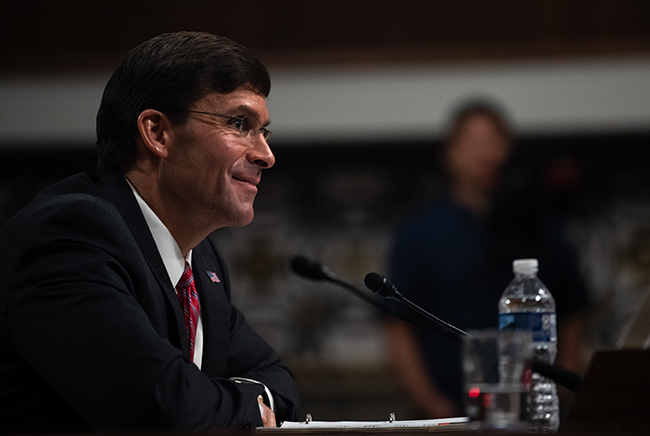
Army Secretary Mark Esper answers questions from members of the Senate Armed Services Committee during his July 16, 2019, confirmation hearing in Washington, D.C., held one day after President Donald Trump formally nominated him for defense secretary. DoD photo by Army Sgt. Amber I. Smith.
Defense secretary nominee Mark Esper enjoyed largely bipartisan support at his July 16 confirmation hearing before the Senate Armed Services Committee—presaging a smooth, fast-tracked approval process in the full chamber—despite fielding criticism from Sen. Elizabeth Warren (D-Mass.) about his time at Raytheon.
Esper appeared before the committee the day after his nomination became official, and could be confirmed within a week. In another measure of his popularity on Capitol Hill, the Senate voted 89-6 to confirm him as Army secretary in 2017. He has “candor and principle and a willingness to remain independent even in the most challenging circumstances,” Sen. Tim Kaine (D-Va.) said this week.
Outlining his priorities before lawmakers, Esper said the “need to balance current readiness with modernization is the department’s central challenge and will require strong leadership, open and continuous dialogue with Congress, and the courage to make tough decisions.”
Bipartisan congeniality on routine issues like the National Defense Strategy lasted until, two hours into the hearing, Warren brought up Esper’s time as Raytheon’s chief lobbyist —a job for which he will still receive deferred compensation. The nominee’s ethics agreement governing his interactions with Raytheon expires in November, and his agreement includes the possibility of waivers that would allow him to be involved with certain issues.
In a testy exchange with Warren, Esper said he has abided by his ethics agreement and has not sought any waivers, though he didn’t promise to avoid waivers in the future. Esper also rejected Warren’s request for a guarantee that he wouldn’t seek employment at Raytheon or another defense contractor after leaving the Pentagon.
“Let me get this straight: you’re still due to get at least a $1 million payout from when you lobbied for Raytheon, you won’t commit to recusing yourself from Raytheon [decisions], you insist on being free to seek a waiver to let you make decisions affecting Raytheon’s bottom line and your remaining financial interest, and you won’t rule out taking a trip right back through the revolving door on the way out of government service,” Warren said.
Esper highlighted his Army service and pushed back on the idea that “anybody who comes from the business world is corrupt.” The nominee said his time at Raytheon better prepared him to be defense secretary because it gave him extensive knowledge of “what makes industry tick,” along with a “rich understanding of the supply chain and how important and fragile it is.”
Immediately following Warren’s time, Sen. Dan Sullivan (R-Alaska) gave Esper an additional chance to respond by asking if he had ever been accused of corruption.
“No, sir, never in my life,” Esper said.
Patrick Shanahan, Esper’s predecessor as acting defense secretary, also came from industry and extended his ethics agreement with Boeing to indefinitely recuse himself from all company matters.
The bulk of the confirmation hearing focused on Esper’s pledge to continue the Pentagon’s focus under last year’s National Defense Strategy, with much of the time specifically focused on countering a rising China.
“The threat posed by China cannot be overstated,” Esper said.
Esper pledged to continue modernizing the nuclear triad, along with pressing forward on the new low-yield nuclear missile revealed in the 2018 Nuclear Posture Review. Such a weapon is needed because “we cannot stand by while Russia arms itself” with its own missile that violates the Intermediate-Range Nuclear Forces Treaty, he said.
He pledged to work with Congress to create the proposed Space Force and to continue reviving US Space Command, as well as to address the high-level Defense Department positions that remain unfilled. Esper said he spoke with White House officials this week about refilling 14 Pentagon leadership spots that require Senate confirmation.
The military’s biggest challenge at the moment is to avoid letting Iran and other near-term problems distract from long-term issues such as countering China, Esper said. He took over as acting defense secretary as tensions between the US and Iran flare this summer, though he said his goal is to get this situation “back on the diplomatic channel” and avoid military involvement.
Esper noted in response to advance policy questions that the Pentagon will continue to support government-wide efforts to counter Russian influence around the globe, but that “DOD efforts to date have not yet achieved a significant change in [Russian President Vladimir] Putin’s behavior.”
Notably missing during the almost 3-hour hearing: Esper did not face a single question about the 18-year-long war in Afghanistan.